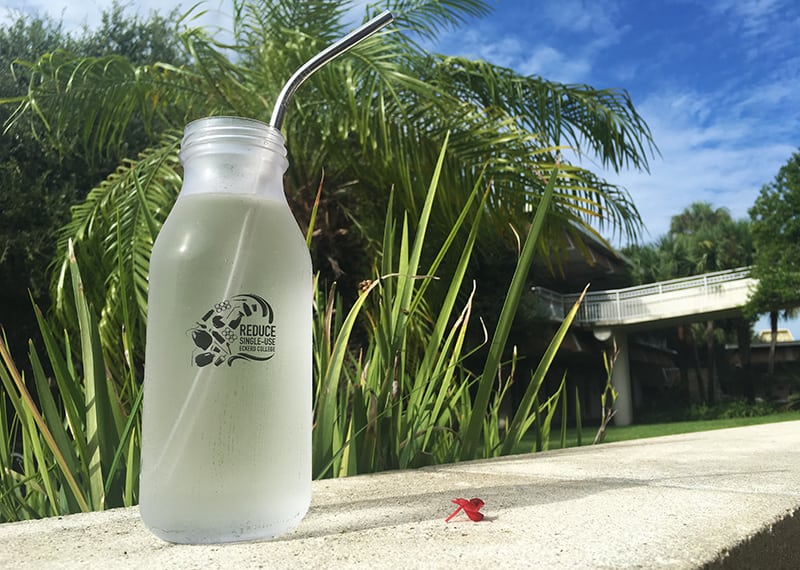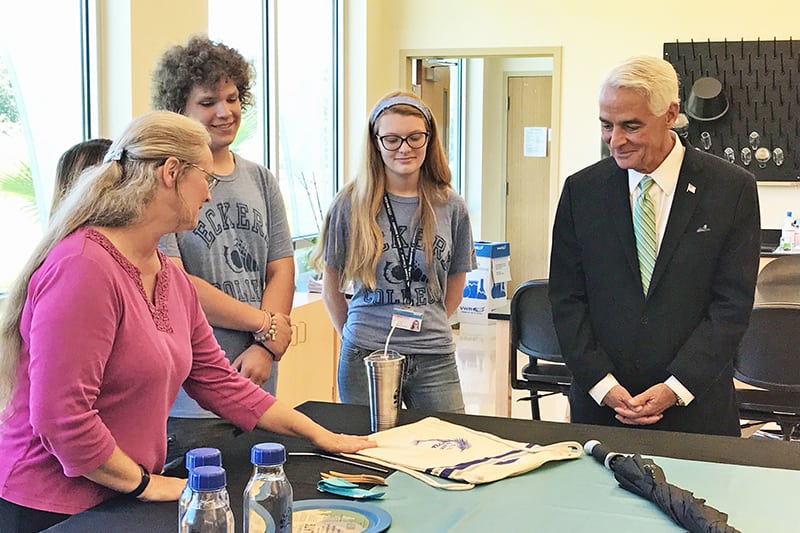
Visitors touring campus are now offered this reusable water bottle and metal straw
Weeks before he arrived on campus, Stephen Boerner ’22 was intrigued when he opened a package from Eckerd College and out slipped a branded metal straw.
“There was a note that said something like ‘Expect another gift when you arrive,’ and when we checked in, they gave us these metal tumblers to go with the straws,” said the first-year student from Newtown Square, Pa.
The straws and tumblers given to all first-year students were the initial waves in a new tide rising at Eckerd College. With a $115,124 grant from the National Oceanic and Atmospheric Administration (NOAA) Marine Debris Program, the College will provide reusable alternatives to reduce single-use plastics campuswide—from plastic bottles to bags and ponchos.
Awarded in early spring, the matching grant gave the College the freedom to launch these initiatives, including providing umbrellas to all guests who tour campus on rainy days. The project is the brainchild of Associate Professor of Biology and Marine Science Shannon Gowans and Assistant Professor of Marine Science Amy Siuda.
Siuda came to Eckerd three years ago impressed with the College’s commitment for sustainability but aware there was more that could be done. “Students would say they were very environmentally conscious, but then I would see them walking by with a single-use plastic cup of iced coffee,” Siuda said.
Wanting to make a significant change in campus culture, Siuda tapped Gowans and Director of Sustainability Evan Bollier ’11 to apply for the NOAA grant aimed at programming to prevent more marine debris from polluting the world’s waterways. Of the 23 organizations to receive a part of the $2.5 million in funding, only six were schools, and Eckerd College was the only awardee in the state of Florida.
“We’re not looking to ban all plastic, because that won’t work,” Gowans said. “People don’t like being told what to do. But if you give them options, they may choose the option that is best for the environment.”
Having banned plastic straws in 2018, Eckerd is the perfect breeding ground for this sort of change. Students regularly forgo purchasing bottled water in favor of filling their personal canteens at one of our 61 water-bottle refilling stations. Ten more refilling stations will be purchased through the grant, which will fund not only reusable alternatives to single-use plastics such as bamboo plates and utensils, but also three courses on the effects of marine debris on the world’s oceans, and several beach marine environment cleanups.
Stephen is currently enrolled in Siuda’s Plastic Ocean Autumn Term course—a three-week orientation class for first-year students offered in conjunction with the grant—and learning more about his own consumption of plastics than he ever thought possible.
“When we started to look at how much we were using, it was a lot,” he explained. But students are now making an effort by using their refillable drink receptacles and buying snacks in bulk to cut down on small plastics, Stephen said.
Director of Admission Jake Browne can already see the power of options in his office’s new sustainability efforts funded by the grant. Every year, 3,000 families of prospective students—7,650 people—visit the Office of Admission for an Eckerd College tour. In our warm climate, drinking water is essential for the 90-minute walking tour.
“In our communications for the visit, we’ve begun asking visitors to bring their own refillable water bottles. If they don’t, we give them the option to either take a single-use plastic bottle or one of our new branded reusable bottles,” Browne said. “Anecdotally, we’ve seen more people opt for the reusable bottle.”
Observations like Browne’s are also being tracked and compiled into a scientific study that will inform NOAA of the campus’s progress over the two-year grant period. The best practices for changing our campus culture might become the blueprint for reducing plastic waste at other institutions.
U.S. Congressman Charlie Crist (D, FL-13) visited Eckerd on Aug. 27 to congratulate the faculty on receiving the grant and to learn more about our sustainability efforts going forward.
“This is an important issue,” Crist said. “We are proud of Eckerd’s efforts.”













